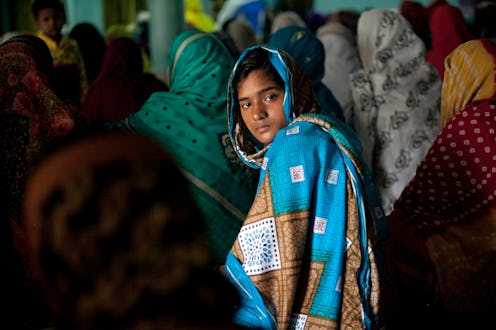Life
Common Questions I Get Asked As A Muslim Woman

People have long made false and harmful assumptions about Muslim people, and that's all the more true after 2001. As a Muslim woman, with a Muslim family, and a very Muslim name, I get asked a lot of questions by people who are either genuinely looking for education and clarification — or are ignorant, racist, and Islamophobic. As someone who doesn't mind answering a lot of questions for people about my identities, I usually share as much knowledge as I can about what I know (though I certainly don't know everything about the religion), but recently, I've been finding that more and more people are asking me questions in an accusatory or uncharitable way. So, to dispel some rumors and address common questions in one place, I've created this short guide to the five most popular questions I get asked about my religion, particularly concerning my womanhood with regards to that religion.
Perhaps the most important question to address is the ever-popular, ever-misguided, "Why are you part of such a hateful religion?" So let me take care of that one right off the bat: Islam (which, by the way, means "peace") is neither inherently violent, nor is it inherently sexist; however, through a combination of the media and Islamic fundamentalists and extremists, Western notions of the religion have become so skewed that it often appears as such. This is the number one most important thing to know about Islam: The original teachings promote only love and peace.
Here are five more common questions I get asked as a Muslim woman today. Again, I don't know everything about the religion and I don't speak for all Muslim women — but here's how I usually answer them.
1. "Why Don't You Wear A Head Scarf?"
Not all Muslim women wear headscarves. For those who do, it's an important part of the religion and important form of expression and modesty, but those who don't aren't any less Muslim than those who do. The Quran does not itself say that the headscarf is mandatory, but it encourages people to dress modestly. For a lot of women, that is a headcover. For other women that may mean not showing their arms or legs. It is a clause that is up to interpretation.
2. "Doesn't Islam Hate Women?"
Like every other religious text, the Quran has parts that may be interpreted as being uncharitable towards women. However, just like most Christians practice love and refuse to take seriously those parts of the Bible that may harm or hinder people, most Muslims do the same. Also, for the record, many parts of the Quran and aspects of Islam that people perceive to be anti-feminist are, in fact, not. For example, Islam teaches that men and women are equal before God, and Prophet Mohammed himself condemned sexist practices of 7th century Arabia.
3. "How Often Are Females Terrorists In Islam?"
I get asked this question surprisingly often, especially after the tragic San Bernardino shooting, but it's usually a disguised way for someone to ask me, "Are you or do you know any terrorists?" Honestly, I have no idea what the statistics are for female terrorists in Islam; I don't pay attention to terrorism as a specific tenant of Islam, because terrorism actually isn't a specific tenant of Islam. Instead, I think about it as a whole, since people of all religious backgrounds and ethnicities can be terrorists. News flash: Most Muslims don't know anything more about terrorist activity or organizations than the rest of the world does.
4. "Are You Going To Get An Arranged Marriage?"
Though many Muslim and brown people do practice arranged marriage, many do not. You don't have to adhere to classic rules of the Quran or traditional Islam to be a Muslim! Like Christianity or Judaism, you can still have faith, but practice the traditions in a way that's different from the literal way. You don't see all Christians avoiding mixed fabrics, right?
5. "Are You Going To Leave The United States If Trump Gets Elected President?"
Yes. Absolutely.
For more stories like this, check out Bustle on YouTube.
Images: Allison Joyce/Getty Images ; Giphy (5)